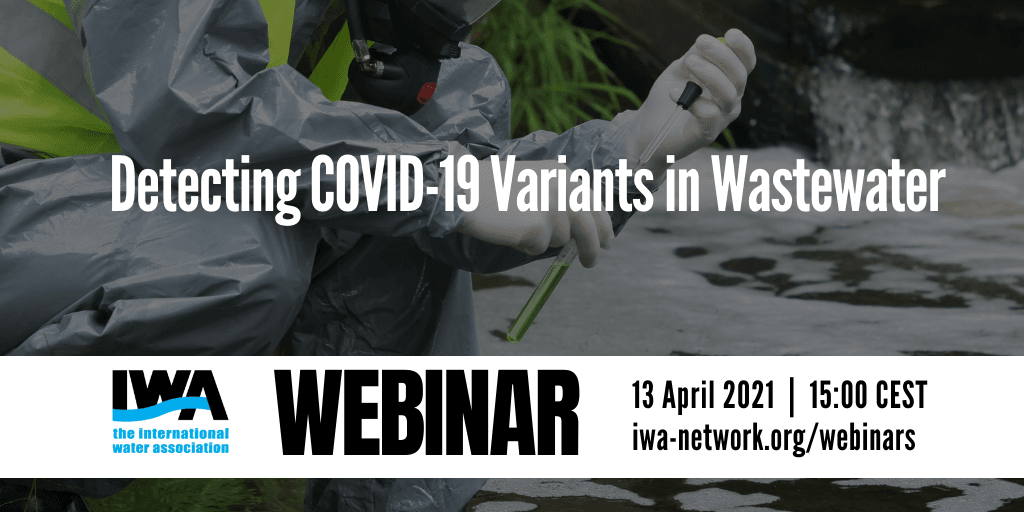Detecting COVID-19 Variants in Wastewater
The tracking of RNA material from the SARS-CoV-2 virus in wastewater has been proposed worldwide as an epidemiological tool and early warning system to help combat the COVID-19 pandemic. Wastewater-based epidemiology aims to complement other COVID-19 surveillance data, including clinical testing, by providing pooled data for a specific area including symptomatic and asymptomatic patients, and to provide data where COVID-19 clinical testing is limited.

Starts
Apr 13, 2021
Language
EnglishMember fee: $0.00
Standard fee: $0.00
Webinar Video
Webinar Presentation
Description
The emergence of more virulent SARS-CoV-2 strains worldwide has increased the need to keep track of variants and their abundance. Limited published research has shown the presence of variants of SARS-CoV-2 in the sewershed. Tracking of these variants and their abundance in the sewershed could provide an early warning system for more virulent strains.
This webinar will present the latest and most appropriate methodologies, research and findings with respect to detecting SARS-CoV-2 variants in wastewater. The event is open to all interested parties to understand how wastewater-based epidemiology can be used to support public health decisions and identify the genetic diversity and prevalence of SARS-CoV-2 variants in a given population.
**Webinar Resources ** Here are some resources recommended by the webinar panelists:
Papers
- Rapid screening for SARS-CoV-2 variants of concern in clinical and environmental samples using nested RT-PCR assays targeting key mutations of the spike protein; G. La Rosa, P. Mancini, G. Bonanno Ferraro, C. Veneri, M. Iaconelli, L. Lucentini, L. Bonadonna, S. Brusaferro, D. Brandtner, A. Fasanella, L. Pace, A. Parisi, D. Galante, E. Suffredini; Water Research; 2021 (Open Access) Preprints
- Droplet Digital RT-PCR to detect SARS-CoV-2 variants of concern in wastewater; L. Heijnen, G. Elsinga, M. de Graaf, R. Molenkamp, M.P.G. Koopmans, G. Medema; medRxiv; 2021 (Open Access)
- Detection of SARS-CoV-2 variants in Switzerland by genomic analysis of wastewater samples; K. Jahn, D. Dreifuss, I. Topolsky, A. Kull, P. Ganesanandamoorthy, X. Fernandez-Cassi, C. Bänziger, E. Stachler, L. Fuhrmann, K.P. Jablonski, C. Chen, C. Aquino, T. Stadler, C. Ort, T. Kohn, T.R. Julian, N. Beerenwinkel; medRxiv; 2021 (Open Access)
- Monitoring SARS-CoV-2 circulation and diversity through community wastewater sequencing; R. Izquierdo-Lara, G. Elsinga, L. Heijnen, B.B.O. Munnink, C.M.E. Schapendonk, D. Nieuwenhuijse, M. Kon, L. Lu, F.M. Aarestrup, S. Lycett, G. Medema, M.P.G. Koopmans, M. de Graaf; medRxiv; 2020 (Open Access)
Websites - SARS-CoV-2 in Wastewater; Eawag (Open Access) - V-pipe: A bioinformatics pipeline for viral sequencing data; Github (Open Access) - COJAC – CoOccurrence adJusted Analysis and Calling; Github (Open Access)
Panelists
- Gertjan Medema https://www.linkedin.com/in/gertjanmedema/ – KWR, Netherlands
- Tamar Kohn https://people.epfl.ch/tamar.kohn – Swiss Federal Institute of Technology in Lausanne, Switzerland
- Niko Beerenwinkel https://bsse.ethz.ch/department/people/detail-person.MTQ5NDE3.TGlzdC8yNjY5LDEwNjI4NTM0MDk=.html – Department of Biosystems Science and Engineering, ETH Zurich, Switzerland
- Giuseppina La Rosa https://www.researchgate.net/profile/Giuseppina-Rosa – Istituto Superiore di Sanità, Italy
- Elisabetta Suffredini https://www.linkedin.com/in/elisabetta-suffredini-83a23987/ – Istituto Superiore di Sanità, Italy
- Joan Rose https://www.linkedin.com/in/joan-rose-1bbb626 (Webinar Moderator) – Michigan State University, USA
- Banu Örmeci https://www.linkedin.com/in/banu-ormeci-2074b5128/ (Webinar Organiser) – Global Water Institute, Carleton University, Canada
Target Audience
Public health, water and sanitation professionals; water utilities; science councils; consultants; universities; research, commercial and pathology laboratories
Learning Objectives
Following this webinar, participants will be able to:
- Understand the methodologies associated with SARS-CoV-2 variant detection;
- Appreciate the usefulness of the wastewater-based epidemiology (WBE) approach to support clinical data on evolving SARS CoV 2 variants;
- Identify the steps required to monitor variants in a sewershed and keep track of which variants are becoming virulent through their abundance.